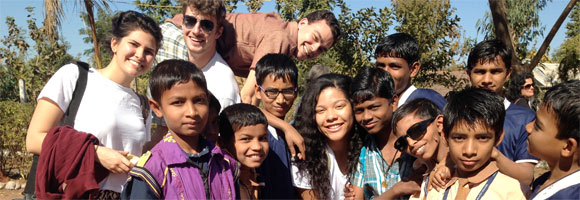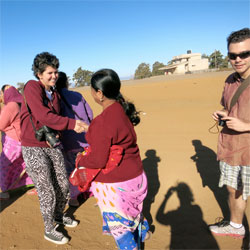
Standing on a street in New Delhi, India, watching a wedding procession, Yma Winton ’15 was struck by the duality of Indian society. While the groom rode in a vintage Rolls Royce and the family displayed opulent jewelry, poor children approached Winton and her classmates to beg for money and food.
“The presence of extreme poverty was seemingly ubiquitous, but so was India’s apparent economic expansion,” says Winton, a government and law major from Los Angeles. “Being able to experience this sort of dichotomy between the rich and poor in a country that has recently been characterized by its economic expansion really caused me to contemplate the importance of global expansion taking place with social justice as a key element.”
Winton’s observation is at the heart of the short-term study abroad course India: Global Economic Power or Not? She and 15 other students traveled over the January interim session to various locations in India, including Mumbai, New Delhi, Agra, and Jaipur, to learn how economic growth has impacted different segments of society, including aspects of gender, ethnicity, and religious identity. The three-week course was led by Anu Ghai, lecturer in economics, and Hannah Stewart-Gambino, professor of international affairs and government & law. Jamila Bookwala, professor and head of psychology, also joined the group.
The Education Gap
Emma Spencer ’17 (Scarsdale, N.Y.), is eager to learn more about education policy in the U.S. after witnessing some of the challenges faced by schools in India.
During the January interim session, her study-abroad class visited a school in the slums of Thane, a town located about two hours outside Mumbai, with the Reach Education Action Programme, an NGO dedicated to empowering women and children through education. The group also spent time at a tribal school in Gujrat operated by the parents-in-law of Jamila Bookwala, professor and head of psychology.
An international affairs major, Spencer wondered whether India would restructure a seemingly broken education system or allow its people to play the primary role in educating children. The public education system, she says, is mismanaged and poorly funded, leading to privatization, which in turn limits educational access to the wealthy.
“Looking back, I wonder how similar the United States’ education system is to that of India based upon the wealth gap and increasing budget cuts,” she says. “I hope to learn more about that at Lafayette.”
It was important, says Ghai, for students to connect real people with the policies that affect their lives. And, for many students, that was an eye-opening experience. While there certainly was sightseeing to do, the group also met with business owners, call center managers, trustees of tribal schools, and NGO workers. Students interacted with both adults and children to gain a more complete understanding of Indian society.

A double major in economics and policy studies, Rebecca Wai ’18 (Singapore) used what she learned in class to apply a macro perspective to what her group studied on the micro level in India. Wai says that talking to average Indian citizens helped put the stereotype of corrupt Indian government in perspective. One person told them, “If the government is involved, we know not to touch it.” A.D. Singh ’80, a well-known entrepreneur in the restaurant industry in Mumbai and New Delhi, shared with them that government officials closed his restaurant for two years without cause.
Benjamin Draves ’18 (Alliance, Ohio), too, was surprised by how deeply the general population distrusts the government. He saw two Indias during his travels: one on the government ledger and one not. The course, he says, was not simply about economics. As he and his classmates learned more, they realized that there are strong connections among economic prosperity and human rights, infrastructure development, and government policy.
Draves learned plenty about himself, as well. Students kept daily journals that detailed what they learned each day and helped them process their feelings on rampant poverty in light of explosive economic growth. Each evening, students took turns leading group discussions that connected what they observed to their readings.
“I learned more in three weeks about India than if I had taken three courses on India in the States,” says Draves. “Study abroad is just as much about understanding yourself and your own biases as it is about learning about the country in which you study.”
While students were learning about India through the eyes of its citizens, Ghai was interested to see India through her students’ eyes.
“I was astounded by the depth of perceptions gained from our students,” she says. “Seemingly random—to me—events would rightly have an enormous impact on how students perceived their surroundings and themselves.”


1 Comment
India’s economic growth is firming up and prospects are also looking better in most of the other major economies, says Paris-based think tank OECD.
Comments are closed.